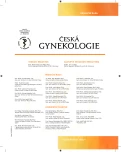Level of AMH as a predictor of the result of ovarian stimulation
Authors:
P. Vrublovský
Authors‘ workplace:
IVF Clinic, MUDr. Š. Machač, Ph. D.
; Gynekologicko-porodnické oddělení Nemocnice Šternberk, primář MUDr. M. Vaca
Published in:
Ceska Gynekol 2016; 81(1): 23-26
Overview
AMH levels are commonly measured in fertility clinics to assess ovarian reserve and give an indication of female fertility potential. AMH levels are useful in deciding on stimulation protocols for IVF cycles. High AMH levels are useful to confirm a diagnosis of polycystic ovaries. AMH is useful to predict ovarian response to stimulation. Currently AMH levels can not be used to predict a couple‘s ability to conceive naturally.
KEYWORDS:
AMH, ovarian stimulation, ovarian reserve, fertility
Sources
1. Bentzen, A., Forman, JT., Pinborg, A. Ovarian reserve parameters: a comparison between users and non-users of hormonal contraception. http://www.lidegaard.dk/Publ/12%20Bentzen.pdf.
2. Bhide, P. The role of anti-Müllerian hormone as a predictor of ovarian function. Obstet Gynaecol, 2012, 14, p. 161–166.
3. Boyle, P. Reduced ovarian reserve Is there any hope for a bad egg, http://www.fertilitycare.net/documents/Boyle-AMH.pdf.
4. Dewailly, D., Andersen, CY., Balen, A., et al. The physiology and clinical utility of anti-Mullerian hormone in women., Hum Reprod Update, 2014, 20(3), p. 370–385. Epub 2014 Jan 14.
5. Dillon, KE., Sammel, MD., Prewitt, M., et al. Pretreatment antimüllerian hormone levels determine rate of posttherapy ovarian reserve recovery: acute changes in ovarian reserve during and after chemotherapy. Fertil Steril, 2013, 99(2), p. 477–483. Epub 2012 Oct 18.
6. Durlinger, AL., Kramer, P., Karels, B., et al. Control of primordial follicle recruitment by anti-Müllerian hormone in the mouse ovary. Endocrinology, 1999, 140(12), p. 5789–5796.
7. Durlinger, AL., Gruijters, MJ., Kramer, P., et al. Anti-Müllerian hormone inhibits initiation of primordial follicle growth in the mouse ovary. Endocrinology, 2002, 143(3), p. 1076–1084.
8. Fanchin, R., Schonäuer, LM., Righini, C., et al. Serum anti-Müllerian hormone dynamics during controlled ovarian hyperstimulation. Hum Reprod, 2003, 18(2), p. 328–332.
9. Gerli, S., Favilli, S., Brozzetti, A., et al. Anti-mullerian hormone concentration during the third trimester of pregnancy and puerperium: a longitudinal case-control study in normal and diabetic pregnancy. Endocrine, 2014, 50(1). DOI:10.1007/s12020-014-0515-4.
10. Grøndahl, ML., Yding, C., Bogstad, J., et al. Specific genes are selectively expressed between cumulus and granulosa cells from individual human pre-ovulatory follicles. http://molehr.oxfordjournals.org/content/18/12/572.full.
11. Hadlow, N., Longhurst, K., McClements, A., et al. Variation in antimüllerian hormone concentration during menstrual cycle may change the clinical classification of the ovarian response. PubMed, Fertil Steril, 2013, 99(6), p. 1791–1797. Epub.
12. Lambalk, CB., Kwee, J., Eijkemans, MJ., et al. Comparison of inter- and intra-cycle variability of anti-Mullerian hormone and antral follicle counts. Hum Reprod, 2010, 25, p. 221–227.
13. Loh, JS., Maheshwari, A. Anti-Mullerian hormone – is it a crystal ball for predicting ovarian ageing? PubMed, Hum Reprod, 2011, 26(11), p. 2925–2932.
14. Seifer, DB., Golub, ET, Lambert, M., et al. Variations in serum müllerian inhibiting substance between white, black, and Hispanic women. Fertil Steril, 2009, 92(5), p. 1674–1678. http://www.ncbi.nlm.nih.gov/pmc/articles/PMC3037722/.
15. Sowers, M., McConnell, D., Gast, K., et al. Anti-Müllerian hormone and inhibin B variability during normal menstrual cycles. Fertil Steril, 2010, 94(4), p. 1482–1486. Epub, 2009.
16. Trávník, P. Gametogeneze, mitóza a meióza. http://www.are.cz/data/file/gametogeneze_mitoza_a_meioza.pdf.
17. Wang, JG., Douglas, NC., Nakhuda, GS., et al. The association between anti-Müllerian hormone and IVF pregnancy outcomes is influenced by age. BMJ, Accepted: June 24, 2010, Published Online: August 02, 2010.
Labels
Paediatric gynaecology Gynaecology and obstetrics Reproduction medicineArticle was published in
Czech Gynaecology

2016 Issue 1
Most read in this issue
- Level of AMH as a predictor of the result of ovarian stimulation
- Ectopic pregnancy in the ultrasound. Case reports. Retrospektive analysis
- Transdermal estrogen spray in therapy of postmenopausal syndrome
- Giant uterine fibroid – case report
